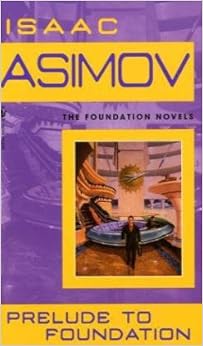Okay, so as my readers probably remember, last week I expressed some serious concerns regarding this week's reading material, Prelude to Foundation. Fortunately, and this is very, very fortunately, Prelude to Foundation abandoned all of the incessant moral arguments of Foundation and Earth and instead returned to the space history and sci-fi adventure which I had originally enjoyed in this series. I really, really enjoyed this book and I'm much more hopeful about the final book, Forward the Foundation, and what it may yet hold in store.
Prelude to Foundation is actually a prequel novel to the series, going all the way back to the waning days of the Galactic Empire when Hari Seldon first presents his paper on the theoretical possibilities of psychohistory, although he is convinced that it will never be a practical field. Seldon soon finds himself embroiled in events on Trantor, capital world of the Galactic Empire, pursued by political players who seek to use psychohistory for their own ends. Seldon then travels through several locations on Trantor, seeing the decaying heart of the Empire, slowly becoming more and more convinced that his psychohistory may be necessary after all.
What I really liked about this book was a return to the feeling of the original novels. The series certainly never really abandoned the space adventure aspect, especially since the last book consisted of an epic quest to try and find the mythical planet of Earth, but that began to be overshadowed by moralistic arguments that went nowhere and became more and more frustrating with each reiteration. In this book we get to see the halcyon days of the Galactic Empire, already sliding towards decline, and see more of the almost mythical Hari Seldon. You get a real sense that large events are happening all around the characters, much like I got in the first three books, and that they're going to be influential in shaping how events are going to play out.
The other thing I really liked is that you got to see aspects of the Empire up close and personal and see how decay has subtly already taken a hold of many of its underpinnings. For example the power station at Dahl is described by its workers as a black box: they have no idea how it works and are content to call in outside help to fix it if something goes wrong. If for whatever reason that knowledge were to be lost, then the Dahl power station would be made useless, but no one is terribly concerned at this potential danger. You see all around a stagnation of innovation and a decline in infrastructure, so necessary in a world-spanning city but slowly falling apart over time. Even the attitude that seems to take a hold of the Empire in later years has already formed, that managing the galaxy is a waste of resources and Trantor needs to turn inwards, abandoning a galaxy-spanning Empire and leaving the provinces to their own devices. It's all very atmospheric and much more enjoyable compared to the previous book.
I will admit that one of my biggest issues is that the events seem to repeat themselves throughout the novel. The characters even comment on the oddity of repeated events, which only serves to draw attention to this fact. The book also kind of ends abruptly, in an "Oh. Well okay then." way. Despite that I really enjoyed this book and I'm hoping the last one will be more like it as well.
- Kalpar


No comments:
Post a Comment